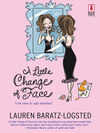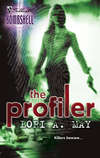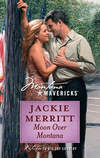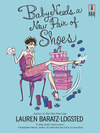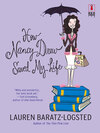Kitabı oku: «A Little Change of Face», sayfa 2
3
No. Not everybody.
About fourteen days after Sarah coughed in front of me, I developed a fever, along with an all-over achy feeling as though I’d spent the night in the ring with the WWF. At first, I thought it was the summer flu. Having not used any sick days yet that year, I called in three days straight at the library. That’s when the spots began to appear.
I’d never been troubled with acne when I was younger. And, yes, I do know that that’s another one of those statements that could make some people hate me. But it’s true. All through junior high and high school, I could barely buy a zit to save my life. Except for the occasional one or two around my period, I was blemish free. How odd then to suddenly be seeing spots at nearly forty. Could my period be due again so quickly? I wondered, studying the spot on my cheek, the one on my forehead.
But then, as the hours went on, and one day turned into the next, I developed more spots on my face…and a few on my neck…and then on my chest.
I called my doctor’s office in a bit of a panic; don’t ask me why, but I was certain I had the measles.
The receptionist at Dr. Berg’s office was very accommodating when I told her I thought I had the measles, saying that he could see me that afternoon. Since it was usually necessary to call two to three months in advance to get a regular visit with the most popular doctor in the city, and even the average garden-variety emergency complaint still required at least a one-day wait to get seen, I recognized how seriously she was taking my spots. The appointment slot I was given was the first after the lunch break, presumably so I wouldn’t infect a bunch of other patients in the waiting room.
Okay, am I the only woman out there who’s a little in love with her doctor?
I’d been seeing Dr. Berg for about a dozen years, ever since my previous physician—whom I’ll call Dr. X—had nearly killed me, which had seemed like a good reason to stop seeing him. Dr. X had been treating me for an infection that wouldn’t go away, and when he started me on yet another round of medication, I began feeling weird. Repeated calls to his office to say just how weird I was feeling had merely yielded the usual “just another hypochondriac” tone from his nurse. Well, naturally, once my body broke out in tiny little red spots from head to toe—a nice indicator of anaphylactic shock—they told me to stop taking the medication. Immediately. That another dose might kill me. But when I tried to get them to admit their mistake, that they should have listened to me in the first place, they insisted that standard practice dictated they do exactly what they did and that they’d do it again tomorrow. That they’d never heard of anyone nearly dying from that particular drug, even though it had nearly killed me. I suspected they didn’t want to admit culpability because they were terrified of a malpractice suit. Well, I wasn’t interested in a malpractice suit, but I was interested in having a doctor who was a mensch, which clearly was not anyone in that office. And they’d nearly killed me.
Did I mention they’d nearly killed me?
Well, naturally, after that experience, I was leery of doctors.
And I was still leery of doctors when I’d first started seeing Dr. Berg, but he’d quickly won me over. He was just so nice, so reassuring, and he took so much time to just talk to his patients—and not just about their illnesses, answering all questions with extreme patience, but even about their lives or whatever was in the news. I always felt so much better just seeing him—that balding head, those steel-rimmed glasses—that I often found myself telling people, “Who cares if he knows anything about medicine? I still love him.” Too bad he was married and a grandfather already.
“So, I understand you’re not feeling so good today, Scarlett,” said Dr. Berg, glancing at what the nurse had written on my chart as he entered the examination room, hand outstretched for a warm shake; Dr. Berg never looked scared that he might catch something from a patient. Dr. X, on the other hand, had always given a can’t-you-people-keep-your-distance look at the audacity of patients coming to see him while sick. “What seems to be the trouble?”
“These spots.” I indicated my face. “I think I have the measles.”
“The measles?” He spoke in a soothing voice as he felt my lymph nodes, examined this, looked at that. “What makes you think so?”
“I don’t know,” I said. “All these red spots—it just seemed to me like this is what the measles would look like.”
“No,” he said, sitting down on the stool next to the examining table, pen already flying across his page, “you don’t have the measles. I’m pretty sure what you have is the chicken pox.”
“The chicken pox?”
“Yes,” he said, starting to write a prescription. “Have you been exposed to anyone recently that may have been infected?”
I told him about Sarah, the girl with the list in the library two weeks ago.
“Yup,” he said, doing the math on the dates, “that’s the incubation period.”
That damned precocious little reader, I thought. Why couldn’t she have waited until later in the season, just like the rest of the kids, to come in for her books? Or at least have waited until she really wasn’t contagious. I suppose that’s Harried Mom’s fault….
“Here,” he said, handing me the prescription he’d written. “Now, I want to warn you. This is going to get a lot worse before it gets better.”
“You mean I’m going to feel even worse than I do now?”
“I’m afraid so. Chicken pox when you’re a kid is pretty easy. But as an adult? The older you get, the harder it is. You’re also going to be contagious for another seven to ten days, so no going out in public places until all the pocks scab over.”
Great.
“Now, I want you to call the office every day to let me know how you’re doing.” There was my reassuring Dr. Berg again. With all that talk of worse pain and the need to be quarantined, I’d wondered where he’d gone to. “This isn’t going to be easy for you and I’m going to want to keep a close eye on you until you start feeling better.”
“Thanks,” I said, glancing up and catching sight of myself in the mirror on the wall. Damn! I already had more spots than I had when I’d first come in there. “Um…can I ask you a question?”
“Of course.”
“Am I going to look like this forever? I feel like that animal in Put Me in the Zoo.”
“Put me in the zoo?” he asked, puzzled.
I sighed the sigh of the long-suffering librarian. It’s amazing how often people don’t get book references.
“Kids’ book,” I elaborated. “Animal keeps changing his spots. Big spots. Little spots. Red, blue, all the colors, really. Am I going to wind up like that?”
I felt strange, exposing myself that way. Over the years, we’d often talked about socio-cultural issues and he knew that I was big on saying that I didn’t think that appearances were as important as people made them out to be, that most women would be a lot happier if they stopped worrying about the outer so much and just focused on the inner. And I’d even backed it up by being the kind of woman who usually dressed casually, almost never bothered with makeup. Would he think now that all that had just been a sham? Would he think me shallow for being so concerned?
But he laughed, that reassuring sound. “Of course not. Provided you don’t scratch, before you know it, you’ll be just as beautiful as you’ve always been. Even with the spots, you still look good, Scarlett.”
It really was too bad about that wife and those grandchildren.
“Can I ask you a question now?” he said.
“Sure.”
“Why didn’t you get the chicken pox as a kid, just like everybody else?”
4
(And now for a little station break, as we talk about my breasts…)
It’s really bothering you, isn’t it? I mean, like, you’re not going to let me go any further until I tell you about those breasts?
Am I right? Come on, I’m right, aren’t I?
Fine. You asked for it. Don’t say I didn’t warn you.
It all started when I was ten years old….
Hard to believe that this silent war I’ve been having with a particular body part has been going on for nearly three-quarters of my life, for twenty-nine years. You’d think I’d be over it by now. God, I need to grow up.
But really, it all started when I was ten years old. Ten was when I went through puberty, got my first period, got my first hint of a pimple and when I heard the words for the first time, those immortal words that no girl or woman can ever hear enough of in her life—can you hear my sarcasm?—as spoken from the still prepubescent wise-guy mouth of Don Deeble, “Man, I’d like to grab a hold of those tits!”
Yeah, my life has been fun.
And it’s only gotten better from there.
On the trampoline; out jogging, even with a humongously camouflaging sweatshirt on; walking by construction sites—there hasn’t been one clichéd set of circumstances I’ve ever encountered in life where a member of the male population has failed to hold up his end of the cliché, has failed to make a loudly rude utterance something along the lines of the above citation from Don Deeble.
And they always preface it with that one italicized word: man.
“Man, those are great…!”
“Man, would you look at those…!”
“Man, man, man…tits!”
It got to the point, pretty early on in life, where it started to seem as though, based on the evidence of those sentences, my breasts could not exist in a man-less vacuum. The way I figure it, the fact that I’m heterosexual has as much to do with the fact that the male population has linguistically linked my breasts to their manhood for all time through the employment of a simple sentence structure as it does to any natural inclinations on my part.
Of course, none of the really fun stuff I’ve mentioned above gives any hint of the dark side of having spectacular breasts: the dates that turn ugly because mere possession of nicer-than-normal mammary glands is somehow interpreted as a law requiring willing sexual congress under risk of penalty for refusal; or the odd male relative who starts showing an unusual interest in your development, or worse; or the fact that some girls write you off without a chance, visibly resenting you, as though you had some kind of control over such a fate, as though you’d made an unholy alliance with the devil of pubescence.
But that’s just yet more of the good stuff.
Did you ever notice how, in today’s world, the most notoriously-breasted woman are all triple-namers? In the past, it was the alliterative that had it, the Marilyn Monroes. Nowadays, it’s the Pamela Sue Andersons and the Anna Nicole Smiths. Which is really bizarre, because that triple-namer thing means there’s still room left on-bimbo-board for…Scarlett Jane Stein?
Okay, now here’s the really killer part:
I do not—repeat, do not—have notorious breasts, not like those other women do.
I have spectacular breasts, which is nowhere near the same as notorious breasts, but is the same as average breasts…which you’ll soon see.
All of those triple-namers—who, by the way, are all blond, which I am not—have breasts that are creeping up on or have even tipped over to the other side of the forty-inch mark. Plus, they have cup sizes that all equal or surpass the enough-is-enough alphabetic place mark embodied by the fourth letter.
I, on the other hand, am a 36C, which is—collective gasp here!—average.
Yes, folks, that statistic is really true: the average American woman is a 36C.
So, why so much fuss about me? Why have all the men I’ve been naked with each uttered some version of the personalized phrase, “Man, Scarlett, but you’ve got great breasts!”? I’ve heard that phrase so often, it’s been so universal in my life, that on more than one occasion I’ve been tempted to inquire of whichever man was humping above me, “Um…uh…excuse me? But this is really an honest question here: Do you say that to all the girls? I mean, is saying that, like, some kind of thing with men?” But I’ve never had the nerve. And, truth to tell, the guys, even though they all say the same thing and all look the same way when they say it, all somehow also have that “Eureka!” look on their face, like they’ve discovered hooter gold where previously they’ve only encountered hooter tin.
Oh, and, parenthetically speaking? Yes, I do know that a lot has been made over the years of the fact that men have a tendency to be—hmm…what’s the most delicate way to put this here?—penis-obsessed, but we gals can be pretty breast-obsessed ourselves, this entire chapter standing as some kind of monumental proof of that fact. We just don’t like to publicize it.
But back to my breasts. Which I still maintain are average.
Did you ever notice how the most spectacular thing that any American kid can aspire to is to be average? Being top of the class is nothing to boast about; being head cheerleader is an open invitation for people to wish obesity on you later in life; being too good at chess is like requesting to get your ass kicked. On the other hand, being stupid means people calling you that; being fat means people calling you that and stupid; being not good at even chess means there’s not even a lowest rung for you to stand on.
The middle. Keeping to the middle ground in everything is the safe place to be as a kid in America.
And this middleness extends to adulthood as well. The wealthy are resented, the poor are blamed, and the message is clear: the safest place to be, even if it’s getting harder to keep up with the housing payments, is middle class.
In the breast department, if in nothing else in this life, I represented the national average, which was interpreted as being a smashing success, breastwise.
So, basically, I was spectacular mostly by virtue of being so damned average.
Oh, and plus the fact that with a waspish waist on a short Jewish woman, my 36Cs really did look like they might be one of those triple-named women’s 40+s.
There was that, too.
5
One of the things about being quarantined for seven to ten days: it gives you a lot of time to think.
Pam herself was not as much of a slouch as she liked to think she was, except for when she slouched, of course, which was often. This had been a big stumbling block in her attempts to build a bridge to the opposite sex; it’s been my observation that, while some think meeting Mr. Right or Mr. Wrong or even Mr. Anybody has to do with the luck of the draw, it’s really all about not being a slouch. A slouch says, “I’m worried about what you think of me, but I don’t think much of me, so why should you?” The non-slouch, on the other hand, says, “Even if you’re not interested in me, I’m having a pret-ty fucking good life here all on my own. So there.” Or she might just say, “My annoying mother always elbowed me in the back when I slouched.” Whatever. The real point is how the world interprets the non-slouch, and the world sees her as confident. Oh, I suppose there are times when the world sees her as arrogant…but who gives a fuck what the world thinks?
Slouchers, that’s who. Slouchers give a great fuck about what the world thinks, which neatly leads us back to our physical description of Pam.
Pam, an attorney, mind you, looked like she made a daily conscious decision to distance herself as much as possible from the thankfully archetypal uber-skinny female lawyer usually portrayed on TV. Now, I’m not saying that Pam was fat. Rather, in an effort to make sure that every male she came in contact with would not even think of treating her like a Twinkie, she had made herself work-asexual. Never mind those micro-mini-skirted suits that the TV lawyers seemed to favor, Pam was determined to furnish her entire career wardrobe from the sales rack at the back of Casual Corner. Thus, Pam owned a lot of brown.
The perverse flipside of Pam’s determined daytime devotion to a dour dress code was that whenever we went out on the town at night, she always went overboard. She tried too hard. Looking at her was like leapfrogging back in time twenty years to the heyday of all those shows about oil barons with wives who never had to work, instead spending their days beating one another up in the swimming pool. She was the epitome of big hair and shoulder pads and enough sequins to choke Liza Minnelli. She was the exact opposite of Daytime Pam, and it required sunglasses to look at her.
Oh, and scary makeup. Truly scary-scary makeup.
I couldn’t tell her, of course. I mean, obviously she thought she was making wise decisions.
Underneath the neutered daytime version and the vamped-up nighttime version, Pam was average: average height (5’4”), average weight (which, in America, currently equals a size 14), average coloring (neither albino nor African-American), average-average-average. Which wouldn’t be a problem for most people, since, as pointed out previously, average is currently the most desirable thing for any American to be, except that in Pam’s case she wanted to be below average in the daytime and above average in the nighttime and she was mostly a dismal failure at both.
Oh, and she did have average American breasts—36C—but, coupled with a size 14 waist, as opposed to my own 2/4/6, well, let’s just say that she was of the belief that side-by-side was never a fair way for us to stand.
If she’d asked me, which she never did, I would have maintained that her failures were caused by being a slouch, both literally and psychologically, while I know she would have insisted that she’d just been cursed with faulty packaging and a low self-image.
“Take you, for instance, Scarlett,” she’d said the Saturday night following the Saturday night when she’d first shot down Bachelors #1, #2 and #3 like duckpins at the carnival.
As I looked into yet another mai tai in yet another bar on yet another Saturday night, I thought to myself, I hate it when we take me, for instance. Why can’t we take someone else for a change?
“If we have to take me,” I said, “can’t we at least take me somewhere exciting for a change?”
“No.”
“Oh.”
“I say ‘no’ so quickly, only because you’ve already had more than your fair share of unearned excitement in your life.”
“Oh. Right. I had forgotten about that.”
“Now, now. There’s no need for you to do that ‘oh’ thing you do with me.”
“Oh. Okay.”
“You know, Scarlett, I don’t know why you always feel the need to make having a conversation with you so difficult.”
“Isn’t this the point where, if I were a lawyer like you, like you’re always urging me to be, I’d say to you, ‘Let’s move on’?”
“Point taken.”
I attempted a winning smile. “Redirect?”
“Are you asking for permission to question yourself?” She shook her head. “Honestly, Scarlett, you’re not that good at being a lawyer.”
“Oh.”
“You’re doing it again.”
“Oh.”
“So cut it out.”
“Oh, okay.”
“No. Really. I mean it—cut it out.”
“Fine. For some real fun, then, why don’t we get back to your ‘Take you, for instance, Scarlett.’ I’m pretty sure that’s a line of discussion I’ll really enjoy.”
“Be snippy, if you want to. But I meant what I said the other night.”
“What other night? What thing you said?”
“When we were out last Saturday night, when all those men—one, two, three—kept hitting on you, when I asked you if you didn’t maybe think the real reason behind all the male attention you receive had something to do with the unfair advantage you have in the looks department.”
“Oh. That.”
“Yes. That. Well, what do you think?”
“I think that I’ve decided to forgive you for bringing it up and for saying it in the first place.”
“Forgive me?”
“Yes, you.”
“Whatever for?”
“Well, just for starters, the implicit message in your assessment is that I have no merit as a woman in my own right, that no one’s ever wanted to be with me simply because I’m—oh, I don’t know—fun to be with.”
“Now you’re sounding touchy. I thought you said I was forgiven.”
“You are. But just because I’ve forgiven you, it doesn’t mean I’ve forgotten what you said. Or what you must have meant by it. I mean, God, Pam, are you actively trying to insult me? Are you trying to instill free-floating feelings of worthlessness in me?”
“Uh, no.”
“Then what?”
“I’m just trying to get you to acknowledge that you were born with an unfair advantage.”
“How is it unfair, when I had nothing to do with the features I was born with? And I prefer to believe that I—oh, I don’t know—earned whatever I have in life.”
“How have you earned it? By going to the gym regularly?”
“No. That’s just how I earned some specific body parts. And, anyway, have you ever noticed how whenever we get into a heated discussion with each other, we always feel the need to verbally italicize key words for emphasis? I mean, are we juvenile or what?”
“Uh, in answer to your first question, no. And in answer to your second, uh…NO!”
“OH!”
“Come on, stop being like this. I’m really trying to have a conversation with you here.”
“What conversation? You’re basically saying that men only like me because of how I look, that it has nothing to do with whether or not I’m fun, whether or not I’m nice. You don’t think I’m fun? You don’t think I’m nice?”
She ignored my questions. “Look, if I were to accept the fact that you receive more male attention than I do because of something other than your looks, then where does that leave me? Does that mean that I’m not fun? Does that mean that I’m not nice?”
I returned her earlier favor by not answering her questions, either. Truth to tell, her questions made me uncomfortable. I mean, she was my Default Best Friend, after all. So what could I tell her? Sure, she could be fun…sometimes. Sometimes, she could even be nice. But she could seldom pull off both at once, and, anyway, they weren’t exactly qualities that radiated from her to such an extent that they could function as a man magnet.
Still, I thought about what she’d been saying, and not just tonight or the other night, but the message that had pretty much become an undercurrent of our about-the-opposite-sex conversations practically since we’d first met. Truthfully, I couldn’t understand why guys never called her a second time. Okay, there was that slight fashion-sense problem she had, but clothes weren’t everything. She really could be fun, sometimes; and she could even be nice, sometimes. Plus, she was a lawyer, for crying out loud, which meant that not only was there tangible evidence of intelligent life lurking within her, as witnessed by the J.D. initials (for Juris Doctor) that she brandished at the end of her name like a fishhook and a club, but also meant that she could uphold her end of any sizable mortgage in Fairfield County—no small feat for a woman in a two-income real estate world. I thought about all that, and I thought about the things that I had to bring to any relationship table—my looks and being fun, my looks and being reasonably nice, my looks and…and I began to wonder: Did Pam maybe possibly have something there? Had I been occupying an unearned seat on the gravy train all of my life?
I slumped back, sighed. “What exactly is it that you want, Pam?”
She leaned in closer to the table, eager. If I was deflated by the direction our conversation was taking, she was excited. “What I want is for the playing field to be leveled a bit. What I want is for you to have a little less of what you have, and for me to have a little more of what you have.”
It was at this point—I know, I know, I know—that I should have stopped and asked myself, Did I really want this woman to continue in the role of my Default Best Friend? And, why had I ever chosen her in the first place?
But I never got the chance to ask myself that question—not then, at any rate—because it was then that that evening’s Bachelor #1 chose to approach our table, insinuate himself between Pam and me with his back to her as if blocking out some kind of Martian sun, and utter the unfailingly catchy words: “Buy you a drink, pretty lady? I just hate to see a pretty lady sitting all by herself.”
On any other night, that “sitting by herself” part would have been enough to topple Pam over into a seething frenzy, which would have, in turn, prompted her to hit the eject button on my Bachelor #1 before I even had the chance to avail myself of the free beverage on offer. But not on this night. Not on this night that was all of a sudden different from all other nights. No, on this night, instead of doing the usual, Pam craned her neck around the side of Bachelor #1, a smug smirk on her face revealing her satisfaction at having obtained proof of the inherent unfairness of the world, and mouthed the words at me, “See what I mean?”
And, for a moment there, I guess I kind of did.
